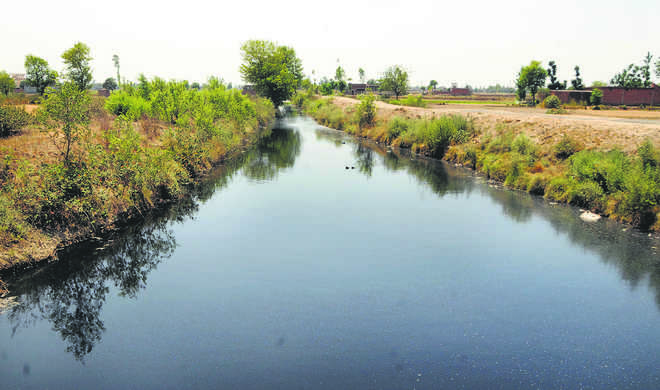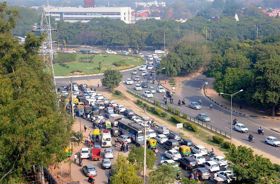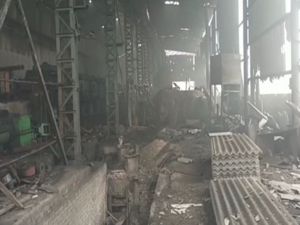
Black water accumulates in the drain near Buttar Sivian village, Amritsar. Photo Vishal Kumar
The eucalyptus don’t lie
Amritsar: It has taken thousands of dead fish in the Beas to turn our focus on Buttar Sivian and 10 other surrounding villages. For years the villagers have been angry with Rana Sugar Mill for discarding nauseating blackish waste water in the nearby drain. The mill has developed a pond on a large chunk of land in which eucalyptus trees are planted. In between the trees, wide and deep trenches have been dug to dispose of the waste water.
The villagers recall their first protest in 2004. “If the Akalis failed to stop the toxic water discharge, how can we expect any action from Congress as the mill is owned by one of their senior leaders,” says a resident of Buttar Sivian village, who wishes not to be named. The sugar mill has a septic tank adjacent to the drain. Mill officials say they have never released the untreated water into the drain. Some employees on duty say it might have reached the drain due to overflowing or a leakage. In less than a hundred meters lies a large plot with eucalyptus trees where trenches are dug for waste water disposal.
Farmers and nearby farm house residents say they do not drink water from hand pumps. The water supply and sanitation department had installed a water tank in a village, but most residents prefer to get water from deep-dug submersible bore-wells. For the poor, hand-pumps or neighbourhood houses are the options.
Gurnam Singh of Dehati Mazdoor Sabha says years after 2004 the people of around a dozen villages had complained about a pungent smell and the ash in the air. “Soon they realized that water in drain was affecting the groundwater. The water taken out from hand pumps was yellowish and smelly. We started an agitation, which ended after the authorities promised us to keep the drain free from the dangerous discharge”.
RN Sharma, general manager Rana Sugar Mill, says the unit follows all the guidelines of the pollution control board. “They often visit us and keep a check on the infrastructure and other conditions. We have a water treatment plant. We recycle the water. We never dump water into the drain.”
— Charanjit Singh Teja
Crisis of free water
Jalandhar: On the Amritsar-Delhi National Highway, you cannot miss a large signboard of the Jagatjit Industry — formed under the patronage of Maharaja Jagatjit Singh of Kapurthala in 1944. The unit abuts village Hamira (Kapurthala). The industrial house manufactures and markets alcoholic beverages, malt, malt extract, milk foods, milk powder, ghee, dairy products, glass and plastic containers. The company’s brand once ranked among the 10 fastest growing brands.
Villagers recall the industry initially provided jobs to many people. Today, there is no fresh water tap in any house of the four villages situated adjacent to the Jagatjit Industry. The chemically treated water is dumped in open tanks. Farmers use this water for irrigation within a 15-km radius.
Hamira is now divided into three ‘pattis’ (parts). Village elders say the groundwater got contaminated around 10-15 years ago. “It turned dark red and stank. We were unable to wash our clothes,” says Satnam Singh, sarpanch. The government began water supply, but told the villagers to pay the bills. Meanwhile, facing huge protests by villagers, the company agreed to provide drinking water free of cost.
Since then, bore wells as deep as 550 feet feed the villages with twice-a-day supply. The villages that get direct supply from the company, even during a power outage, are Hamira Lakhan Khola.
Company officials, including general manager Daljit Singh refused to speak. Kapurthala deputy commissioner Mohammad Tayyab said the administration would “soon” take up with the industry the ways to restore groundwater table in the area.
— Rachna Khaira
Deaths, Dilemma
Hoshiarpur: Reddish-brown stinking water fills plantation and irrigation areas meant for utilizing the water from the treatment plant. The eucalyptus trees, well-known for quickly absorbing water, have turned brown — some of them rotting in the reddish-brown water. Fly ash from AB Sugar Mill and AB Distilleries has piled up in an open area.
According to pollution control laws, the ash should be disposed of in a specially prepared covered pit. There are two huge tanks with 7,000 kiloliters and 3,500 kiloliters of spent-ash. These were used for producing biogas. The sludge left behind was used for bio-composting. Both the tanks were sealed by the pollution control department over a year ago. The huge quantity of spent-wash is lying under seals put up by the PPCB.
Dalwinder Singh Bodal, convenor of a local committee against distillery, says Bodal and Berchha villages are the most affected. “There have been 15 cancer-related deaths in these villages in the last six years,” says Dalwinder. “Two more cancer cases were detected in Berchha this month,” says Berchha sarpanch Satpal Singh.
Former sarpanches Harvinder Singh Jhinger and Varinder Singh Machhiana say a government inquiry in 2014-15 found that the underground water in the mill area and surrounding villages is badly contaminated. “The tube-wells pump out pale yellow water.”
Local legal advisor Lakhvir Singh says based on experts’ suggestions, the SDM and DC had ordered the mill on Sept 14, 2016, to install 20 tube-wells at various levels and keep them running for 24 hours for a year so that the contaminated water could be pumped out. “But they have installed only four.”
Vice-president of AB Distilleries SK Gupta claims there is no violation of rules. “We have put in place all kinds of pollution control measures. For example, we have installed the latest reverse boiler-cum-incinerator for effluents and spent-wash.” About the number of tube-wells to be installed at various elevations, he said: “No one has told us to what levels these have to be put up, so we did whatever best we could.”
— Sanjiv Kumar Bakshi
Hold your nose at Maine
Patiala: As you hit Patiala-Maine road, cover your face and hold your nose. For nearby residents, it is a routine sight. People around village Maine have a common grouse: the distillery has polluted the drain so badly that sometimes it is difficult to sit inside the house. Officials of Patiala Distilleries and Manufacturers Ltd say the unit does not discharge the untreated water beyond a limit. PPCB officials have given the unit a clean chit.
Villagers show a drain of the Patiala Choti. “Not even animals drink this water. “It is no sewage, but the chemicals present there,” says a villager. “You can see the underground pipes bringing the chemicals-laced water to the riverbed. This is done furtively at night to escape detection,” says Krishan Chand, a villager. “We use the underground water for drinking and agriculture. One can imagine what can happen to us or to those who eat vegetables grown using this water.”
Distillery manger Neeraj Bansal says the unit was not discharging any water outside their premises. “We have 282 bigha of land around the unit where we have over 40,000 eucalyptus trees which take care of the discharged water.”
PPCB environmental engineer SS Matharu dismisses villagers’ allegations. “Everything there is under CCTV and the underground pipes only discharge storm water which accumulates after heavy rains,” he says. “Plus, we also conduct random sampling of the water.”
— Aman Sood
Black Bein bleeds
Jalandhar: “No one comes to us, no one stays with us. Relatives say it smells here and children have allergy marks on their faces,” rues Jagdish Kaur of the Mahalon village at Nawanshahr. The village is situated a few kilometres from the Nawanshahr Cooperative Sugar Mills and lies by the banks of the local Bein. Sewage water from the city and the ‘treated’ effluent from the mill are being dumped into the Bein. The mill (a cooperative) owners maintain the unit meets the best standards in effluent treatment in the state, and that the pollutants in its drain are within the permissible limits, a claim backed by the PPCB.
Mahalon is one of the many villages that bear the brunt of the black water carried across the fields. Ujagar, an old Mahalon resident, says he has seen better days of the river. “The day they began dumping the city’s sewage and the mill’s water into the river, it turned into a hell for us. Taps and tanks became useless. The groundwater is unfit for consumption and hand pumps have been dumped for long.”
While pointing to the plants growing by the Bein, panch Balbir Singh says: “It’s off season now. During the production season, there is an additional flow of water in the Bein. All we know is both mill waste and city’s dirt fall into the drain. For days the water has a strange smell, its level also rises suddenly at night.”
Jagdish Kaur, another village resident living there for the past 40 years, says, “Fevers take long time to go and other diseases are common. Our children get allergies and our relatives shy away from visiting us. In the evenings one can’t stand there.”
GM of the Nawanshahr Cooperative Sugar Mills says, “For the past over a month, the mill is closed. The effluent we drain out meets the permissible limits. There is no question of pollution being caused by the mill.”
Ashok Kumar Kalsi, senior environmental engineer PPCB Jalandhar, said the board recently carried out a drive to check storage of molasses by major units of the area. We have also checked the units at Nawanshahr and Phagwara. Molasses were found to be responsibly stored. So far no discrepancy has been found in Jalandhar mills.”
— Aparna Banerji
‘Mills without STP will be shut down’
What lessons has the government learnt from the Beas disaster?
The incident has shocked us. We are going to call a meeting of all the industrialists and tell them that those who don't have STPs (sewage treatment plants) must install them. Those have them should make them functional. Now no mill, irrespective of the political affiliation, would be allowed to function without having STP and fulfilling environmental norms. As for the department, wherever negliegence took place, action has been taken.
Will industry accept strictness?
No doubt the industry in Punjab is in a bad shape. Our intention is not to harass any industrialist. But they will have to follow rules.
What is the action plan?
The CM has formed a committee under my chairmanship, which will comprise members from multiple departments. We will give our first report within a week.
— Vishav Bharti
‘Online monitoring is on’
Beyond local officers, what is the mechanism to monitor the polluting industry?
Officers from different regions of Punjab are deputed to randomly check pollution in water-effluent sensitive industries. Online monitoring of large and medium industries is also undertaken.
Is there a roadmap being prepared to be presented to the government?
Since the matter relating to cleaning rivers is a multi-departmental task, the state government has formed a committee with administrative secretaries of the departments concerned to take measures to keep the rivers clean and restore ecology.
What is the action plan for distilleries and sugar mills?
The government has already formed a panel consisting of representatives from director of factories, commissioner, excise & taxation and chairman and PPCB. They will recommend measures to ensure the Beas incident does not recur.
— Aman Sood


























